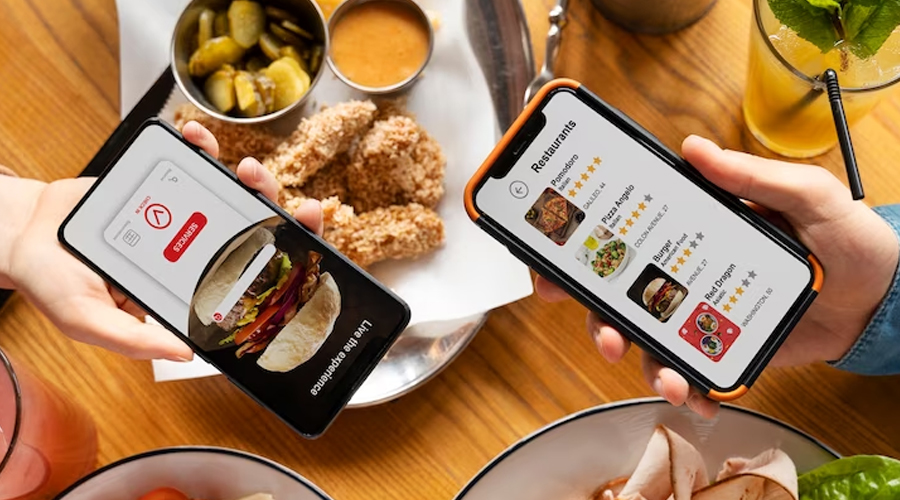Uber Vs. DoorDash: A Legal Battle Over Anti-Competitive Behavior In The Food Delivery Industry

Table of Contents
The Rise of Uber Eats and DoorDash and their Market Dominance
Uber Eats and DoorDash have rapidly become dominant players in the food delivery market, achieving significant market share and influence. Their success, however, has also attracted scrutiny regarding their business practices and potential monopolistic tendencies.
H3: Market Share Analysis:
Precise market share figures fluctuate, but both Uber Eats and DoorDash consistently command a substantial portion of the food delivery market share globally. Their combined market dominance significantly influences pricing, restaurant partnerships, and overall consumer choice within this rapidly expanding sector. Reports from various market research firms consistently place them among the top two or three players, depending on the region. This concentration of market power has raised significant concerns about the competitive landscape.
- Percentage of market share for each company: While exact figures vary by region and fluctuate, both companies frequently hold above 20% each in many major metropolitan areas.
- Geographic reach and expansion strategies: Both platforms aggressively expand their geographic reach, leveraging technology and strategic partnerships to quickly penetrate new markets and maintain their competitive advantage.
- Analysis of their business models and how they contribute to market dominance: Their scalable business models, sophisticated logistics networks, and extensive marketing campaigns have been key factors in their dominance, creating significant barriers to entry for smaller competitors.
Allegations of Anti-Competitive Practices
Numerous allegations of anti-competitive practices have been leveled against both Uber Eats and DoorDash. These allegations primarily focus on predatory pricing and the use of exclusive contracts with restaurants.
H3: Predatory Pricing:
Predatory pricing, a practice where a company sets prices below cost to eliminate competition, is a central allegation in the Uber vs. DoorDash legal battle. Critics argue that periods of significantly reduced pricing by one platform are designed to drive out smaller competitors.
- Examples of low pricing periods and their impact on smaller competitors: Instances of deep discounts and promotional offers, sometimes funded by venture capital, are cited as examples of attempts to undermine smaller players lacking similar financial resources.
- Evidence used to support claims of predatory pricing: Evidence might include internal company documents, financial reports, and analysis of pricing patterns over time.
- Legal arguments regarding the definition of predatory pricing: Defining and proving predatory pricing legally is complex, requiring evidence of below-cost pricing and intent to monopolize the market.
H3: Exclusive Contracts with Restaurants:
Another key area of contention is the use of exclusive contracts. These agreements restrict restaurants from partnering with competing delivery platforms, potentially limiting consumer choice and stifling competition.
- Examples of exclusive contracts and their impact on restaurant choices for consumers: Exclusive deals mean consumers might miss out on their favorite restaurant if that restaurant is only available through one platform.
- Legal challenges to exclusive contracts based on antitrust laws: Antitrust laws often prohibit practices that unduly restrict competition, and exclusive contracts can be challenged on these grounds.
- Analysis of the impact on restaurant owners and their autonomy: Exclusive contracts can limit the bargaining power of restaurants, potentially forcing them to accept unfavorable commission rates.
Legal Ramifications and Ongoing Litigation
The allegations of anti-competitive behavior have resulted in significant legal ramifications and ongoing litigation involving both Uber and DoorDash.
H3: Current Status of Lawsuits:
Several lawsuits and regulatory investigations are currently underway, scrutinizing the practices of these companies. These investigations examine allegations of predatory pricing, exclusive contracts, and other anti-competitive behavior.
- Key arguments presented by both sides: Uber and DoorDash typically argue that their pricing strategies are competitive and benefit consumers through lower costs and greater choice. Conversely, complainants argue these practices harm competition and ultimately consumers.
- Involvement of regulatory bodies (e.g., FTC, DOJ): Regulatory bodies like the Federal Trade Commission (FTC) and the Department of Justice (DOJ) are actively involved in investigating potential antitrust violations.
- Potential outcomes and their impact on the food delivery industry: The outcome of these legal battles could significantly reshape the food delivery industry, potentially leading to increased competition, stricter regulations, or even structural changes within the dominant players.
Impact on Consumers and the Restaurant Industry
The Uber vs. DoorDash legal battle has far-reaching consequences for both consumers and the restaurant industry.
H3: Consumer Perspective:
The alleged anti-competitive practices directly impact consumers.
- Limited restaurant options due to exclusive contracts: Exclusive deals reduce consumer choice, potentially limiting access to preferred restaurants.
- Impact of pricing on consumer spending: While temporary price wars might seem beneficial, they can also lead to instability and potentially higher prices in the long run if competition is eliminated.
- Customer satisfaction and reviews related to the dominant players: Customer reviews often reflect concerns about pricing, limited choices, and overall service quality in relation to the dominance of a few platforms.
H3: Restaurant Owner Perspective:
Restaurant owners also face significant challenges.
- High commission fees charged by platforms: High commissions can significantly cut into restaurant profits, leaving less for other operational costs.
- Dependence on delivery platforms for customer reach: Many restaurants become heavily reliant on these platforms for customer acquisition, leaving them vulnerable to the platform's pricing and policies.
- Impact of pricing wars on restaurant profitability: Price wars initiated by the dominant players can squeeze restaurant margins, jeopardizing their financial stability.
Conclusion
The legal battle between Uber and DoorDash highlights significant concerns about anti-competitive behavior in the rapidly expanding food delivery market. Allegations of predatory pricing and exclusive contracts raise questions about market dominance, consumer choice, and the long-term health of the industry. The outcome of these legal battles will profoundly impact the competitive landscape, potentially fostering greater competition or reinforcing the current dominance of a few key players. To stay informed about the ongoing developments and the evolving dynamics of this critical sector, follow the Uber vs. DoorDash legal battle closely, stay updated on anti-competitive practices in food delivery, and learn more about the impact of market dominance in the food delivery industry. Resources such as legal news sites and regulatory agency websites offer valuable insights into these ongoing cases.

Featured Posts
-
 Increased Access Over The Counter Birth Control And Its Significance In A Post Roe World
May 08, 2025
Increased Access Over The Counter Birth Control And Its Significance In A Post Roe World
May 08, 2025 -
 Resurgimiento Del Psg Derrota Del Lyon En Casa
May 08, 2025
Resurgimiento Del Psg Derrota Del Lyon En Casa
May 08, 2025 -
 Daily Lotto Draw Friday April 18th 2025 Winning Numbers
May 08, 2025
Daily Lotto Draw Friday April 18th 2025 Winning Numbers
May 08, 2025 -
 Celtics Vs Nets Will Jayson Tatum Play Tonight Injury Report
May 08, 2025
Celtics Vs Nets Will Jayson Tatum Play Tonight Injury Report
May 08, 2025 -
 Is Gambling On Natural Disasters The New Normal The Case Of The La Fires
May 08, 2025
Is Gambling On Natural Disasters The New Normal The Case Of The La Fires
May 08, 2025
Latest Posts
-
 India And Us To Discuss Bilateral Trade Agreement Whats At Stake
May 09, 2025
India And Us To Discuss Bilateral Trade Agreement Whats At Stake
May 09, 2025 -
 India Us Bilateral Trade Talks Key Issues And Expectations
May 09, 2025
India Us Bilateral Trade Talks Key Issues And Expectations
May 09, 2025 -
 Hoe Brekelmans India Zo Veel Mogelijk Aan Zijn Zijde Wil Houden
May 09, 2025
Hoe Brekelmans India Zo Veel Mogelijk Aan Zijn Zijde Wil Houden
May 09, 2025 -
 De Indiase Strategie Van Brekelmans Doelen En Methoden
May 09, 2025
De Indiase Strategie Van Brekelmans Doelen En Methoden
May 09, 2025 -
 Analysis India Overtakes Uk France And Russia In Latest Power Index
May 09, 2025
Analysis India Overtakes Uk France And Russia In Latest Power Index
May 09, 2025
